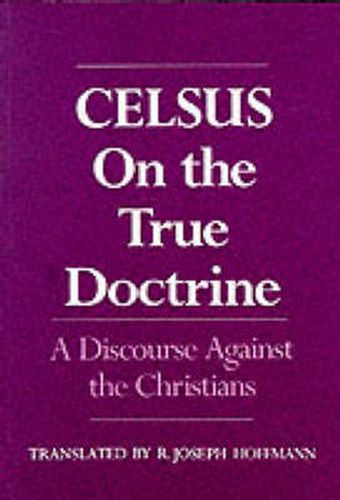Readings Newsletter
Become a Readings Member to make your shopping experience even easier.
Sign in or sign up for free!
You’re not far away from qualifying for FREE standard shipping within Australia
You’ve qualified for FREE standard shipping within Australia
The cart is loading…






The works of many early critics of the Christian church were burned by ruling emperors or otherwise destroyed in the second and third centuries, but the writings of the Greek pagan philosopher, Celsus, have survived indirectly through his eloquent opponent Origen of Alexandria. In his apologetical treatise, Contra Celsum, Origen argues against the ideas set forth by Celsus and quotes from Celsus’ The True Doctrine at length. Through this treatise, Celsus has come to represent the detached pagan voice of the ages. In this translation, Professor Hoffmann has, for the first time, painstakingly reconstructed the main order of the philosopher’s argument. Celsus’ discourse shows him to be an eclectic philosopher–a dabbler in various schools of thought, including Platonism and Stoicism, and a student of the history and religious customs of many nations. Hoffman supplements this definitive translation with an informative introduction, summarizing Celsus’ premises and placing the identity of Celsus in its historical context.
$9.00 standard shipping within Australia
FREE standard shipping within Australia for orders over $100.00
Express & International shipping calculated at checkout
The works of many early critics of the Christian church were burned by ruling emperors or otherwise destroyed in the second and third centuries, but the writings of the Greek pagan philosopher, Celsus, have survived indirectly through his eloquent opponent Origen of Alexandria. In his apologetical treatise, Contra Celsum, Origen argues against the ideas set forth by Celsus and quotes from Celsus’ The True Doctrine at length. Through this treatise, Celsus has come to represent the detached pagan voice of the ages. In this translation, Professor Hoffmann has, for the first time, painstakingly reconstructed the main order of the philosopher’s argument. Celsus’ discourse shows him to be an eclectic philosopher–a dabbler in various schools of thought, including Platonism and Stoicism, and a student of the history and religious customs of many nations. Hoffman supplements this definitive translation with an informative introduction, summarizing Celsus’ premises and placing the identity of Celsus in its historical context.